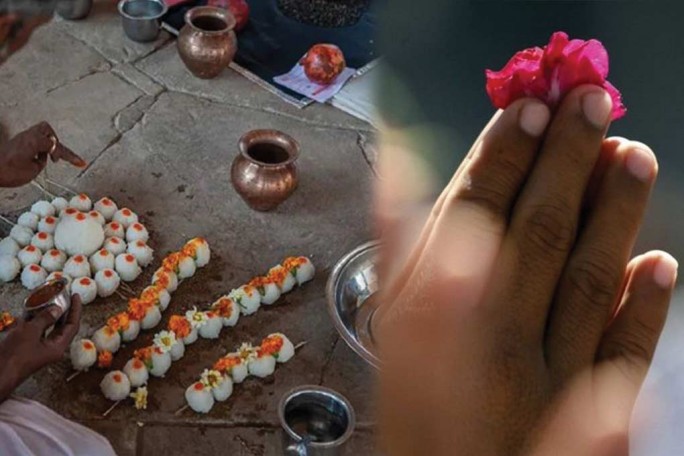Lastjourney Blog
Shraddha Rituals and Ceremonies in Hindu Religion

 Table of Contents
Table of Contents- The Meaning of the Shraddha Ceremony
- What is the Hindu Shraddha ceremony, Pooja?
- How to perform Shraddha Rites?
- First-Year Shraddha Ceremonies
- How to Perform Shraddha Ceremony at Home?
- What happens if you can’t perform all the rituals of the Shraddha Ceremony Pooja?
- What are the advantages of performing Shraddha rituals?
The Shraddha Ceremony holds a significant spot in Hindu custom, filling in as a custom of respecting and honouring expired parents. This Ceremony is critical for guaranteeing the peacefulness of the withdrawn spirits and satisfying familial and profound obligations. This article will investigate the meaning of the Shraddha Ceremony, particularly zeroing in on the first-year customs, how to perform Shraddha at home, and the outcomes of dismissing this significant custom.
Must Read - Pitru Paksha Shradh 2024
The Meaning of the Shraddha Ceremony
Shraddha from the Sanskrit word for "confidence" or "commitment," is a custom performed to offer appreciation to an expired parents. Established the conviction regarding the predecessors guarantees their peacefulness in life following death and that their gifts will direct the family. The service is regularly performed on the worship of the precursor's demise or during the Pitru Paksha, a devoted fortnight for tribal rituals.
The Shraddha custom mirrors profound social worship for parents, perceiving their job in the family's success and prosperity. It includes offering food, water, and supplications to the spirits of the left, guaranteeing they find a sense of contentment and that their spirits are content.
What is the Hindu Shraddha ceremony, Pooja?
As per the religion of Hindus, the Shraddha Ceremony is an important ritual and is generally a day of remembrance. Rituals and ceremonies are performed to pay homage to one’s ancestors, especially the lost parents. The Shraddha rites are conducted so that the journey of our parents after their demise is comfortable and stress-free. It is a way of expressing gratitude for what they are and for praying for the lost parent’s peace.
According to the Hindu calendar, the Hindu shraddha ceremony rituals are performed for both mother and father separately on their respective “thithi.” During the Pitru Paksha or Shraddha Paksha, ceremonies are performed for the entire community of “Pitr.”
How to perform Shraddha Rites?
The period of Shraddha extends for around 15 days right before Sharad Navaratri in autumn. The Karta performs the shraddha rituals by inviting the Brahmanas and worshiping and feeding them. To protect and nourish the ancestors a fire ritual called the “homa” is performed, and then balls of rice are offered to the departed souls.
The offerings are made to three generations, and all the rituals must be performed with devotion, whole-heartedness, and respect towards the deceased. Following the offerings, the ceremony is concluded by extending hospitality to the Brahmanas and giving Dakshina (fees).
There are many people in the community such as funeral service providers who assist in performing all the rituals of Shraddha.
First-Year Shraddha Ceremonies
The first-year Shraddha Ceremony, otherwise called "Barhi" or "Sraadha," is an especially critical Ceremony. It denotes the finish of the principal year since the demise of the individual, and it is accepted to be an urgent time for satisfying the withdrew's spirit's commitments. This Ceremony includes a few key ceremonies:
1. Preparation and Purification:
The Ceremony starts with purging the home and the people in question. This normally includes a custom shower and wearing clean garments. The space where the custom will occur is additionally cleaned and blessed.
2. Invocation of Deities:
The Ceremony begins with the summon of gods and progenitors. This includes reciting explicit mantras and supplications to look for endowments and direction.
3. Offering of Pindas:
Pindas, which are rice balls blended in with dark sesame seeds and ghee, are ready and proposed to the precursors. This is an emblematic portrayal of the contribution of food to the spirits of the departed.
4. Feast for Brahmins:
A huge part of the first-year Shraddha is taking care of Brahmins or ministers, who play out the customs. They are given a dinner that incorporates different treats, and consequently, they offer supplications and favours for the withdrawn soul.
5. Charitable Acts:
After playing out the customs, families frequently participate in things such as offering food, garments, or cash to the Pandit Ji.
6. Family Gathering:
The service frequently includes a social occasion of relatives who meet up to play out the ceremonies, share recollections of the departed, and back each other through this close-to-home time.
What are the Rituals of the Hindu Shraddha Ceremony Pooja?
All the rituals of shraddha rites will be performed by the Karta.
- Invite Brahmanas to worship and feed them
- Perform the fire ritual (Home) appeasing the Agni which will transmit the offerings to your beloved ancestors
- Perform Pinda Pradaana by offering rice balls to departed souls
- Further to extend hospitality and get blessings, the Karta gives Dakshana(fees) to the Brahmanas
How to Perform Shraddha Ceremony at Home?
Playing out the Shraddha Rituals at home includes cautious adherence to custom and custom to know about Pitru Paksha visit How to perform Pitru Paksha shradh at home. Here is a bit-by-bit manual to assist you with leading the service:
1. Choose a Promising Date:
Counsel a Hindu schedule or minister to pick a promising date for playing out the Shraddha. The timing is frequently lined up with the lunar schedule and the particular commemoration of the departed's passing.
2. Prepare the Custom Space:
Select a perfect and calm space in your home for the Ceremony. Set up a raised area or assigned region with an image or icon of the departed, alongside contributions of blossoms, incense, and candles.
3. Gather Fundamental Items:
Gather every one of the fundamental things for the custom, including:
- Pindas (rice balls blended in with sesame seeds and ghee)
- Contributions for the Brahmins (if material)
- Food things for the family and visitors
- Ceremonial things like water, blossoms, and strict texts
4. Perform the Ritual:
Follow the conventional advances:
- Start with a cleansing interaction, including a custom shower.
- Light a light and incense, and proposition supplications to the divine beings and precursors.
- Plan and proposition the pindas to the withdrawn soul.
- Play out the ceremonial taking care of Brahmins, assuming that they are essential for the service.
- Direct a family petition or song to look for favours.
5. Offer Charity:
Take part in altruistic exercises, for example, giving food, garments, or cash. This is a vital piece of the Shraddha service and mirrors the soul of giving and appreciation.
6. Conclude the Ceremony:
End the Ceremony by saying thanks to all members and offering them food and rewards. Guarantee that the custom space is cleaned and any leftover contributions are deferentially discarded.
What happens if you can’t perform all the rituals of the Shraddha Ceremony Pooja?
Disregarding the Shraddha service can have profound and familial ramifications as indicated by conventional convictions:
1. Spiritual Impact:
It is trusted that the inability to perform the Shraddha Ceremony can bring about the departed progenitors staying disrupted or fretful. This is remembered to influence their tranquillity in eternity and may cause an absence of endowments and direction for the living relatives.
2. Family Discord:
A few customs hold that ignoring these ceremonies can prompt familial issues, including debates and false impressions. The exhibition of Shraddha is viewed as a method for keeping up with familial congruity and backing.
3. Cultural and Strict Obligations:
Performing Shraddha is viewed as a hallowed obligation in Hinduism. Not satisfying this commitment might prompt a feeling of responsibility or disengagement from social and strict practices.
4. Negative Effect on Success:
It is trusted that the absence of familial favours because of missed ceremonies could affect the thriving and outcome of relatives, as the progenitors' endowments are remembered to assume a part in their prosperity and accomplishments.
What are the advantages of performing Shraddha rituals?
Pitru Paksha and Shraddha Paksha Hindu death rituals 1-year help achieve triumph in the following areas:
- For financial stability and progress in life
- For procurement of wealth in terms of immovable property and assets
- For progress and smoothness in the running of the business
- For worldly lessons
- To attain spiritual enlightenment enlightenment
- For the betterment of education and knowledge
Some holy chants of deities to create an encouraging atmosphere include Shri Gurudev Datta’s Tarak Chant and Om-Om Shri Gurudev Datta’s Tarak Chant.
Your email address will not be published. Required fields are marked *












